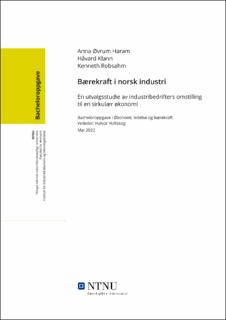| dc.contributor.advisor | Holtskog, Halvor | |
| dc.contributor.author | Haram, Anna Øvrum | |
| dc.contributor.author | Klann, Håvard | |
| dc.contributor.author | Robsahm, Kenneth | |
| dc.date.accessioned | 2022-07-09T17:20:40Z | |
| dc.date.available | 2022-07-09T17:20:40Z | |
| dc.date.issued | 2022 | |
| dc.identifier | no.ntnu:inspera:106261393:112699245 | |
| dc.identifier.uri | https://hdl.handle.net/11250/3004365 | |
| dc.description.abstract | I løpet av de siste årene har fokuset på bærekraft og “det grønne skiftet” økt i det norske og europeiske samfunnet. FNs bærekraftsrapporter skaper et stadig økende press for å løse klimakrisen, og en av løsningene som blir presentert er implementeringen av sirkulær økonomi.
Denne bacheloroppgaven omhandler hvordan norsk næringsliv forholder seg til bærekraft og sirkulær økonomi. Formålet er å undersøke hvordan norske industribedrifter omstiller seg fra en lineær til en sirkulær økonomi, og hvilke barrierer og drivkrefter det er som påvirker omstillingen.
Forskningen i oppgaven er basert på en kvalitativ metode, der det er gjennomført intervjuer med fire bedrifter innen norsk vareproduserende industri. Videre drøfter oppgaven resultatene fra intervjuene opp mot relevant teori.
Funnene fra undersøkelsene viste at bedriftene hadde varierende grad av bevissthet og implementering av sirkulære og bærekraftige tiltak. Det fremgikk også at det er vanskelig for bedriftene å oppnå en sirkulær forretningsmodell, da de eksterne systemene for koordinering ikke er på plass. Drivkreftene som fører til endring oppleves noe ulikt av de forskjellige bedriftene, men alle opplever kundekrav og myndighetskrefter som de mest fremtredende. Fremover vil myndighetskrav kun bli sterkere, og dette vil være et viktig verktøy for å stimulere en videre utvikling. | |
| dc.description.abstract | During the last few years there has been a rise in awareness concerning sustainability in Norwegian and European societies. Repeated warnings from the United Nations sustainability reports are creating substantial pressure on solving the climate crisis. A shift towards a circular economy is presented as a possible solution to this problem.
The subject of this thesis is sustainability and circular economy in Norwegian industry. The thesis explores how companies in the Norwegian industry are adapting from a linear to a circular economy. It also investigates which forces are pushing the adaptation forward and which barriers are slowing it down.
The scientific methods used to gather information are a set of qualitative interviews conducted with four Norwegian industrial companies. The data that was collected through these interviews are further on discussed up against several relevant theories.
The results from the discussion indicated that the companies had varying degrees of awareness and implementation of circular and sustainable measures. It also showed that it´s highly difficult for companies to achieve a circular business model, largely due to the lack of external coordination needed for the transition. The forces that lead to conversion are affecting each company differently, but they all mainly experience customer demands, financial governmental stimulus and regulatory requirements. Regulatory requirements are of growing importance, as they will be the key factor for governments to stimulate further actions towards a circular economy. | |
| dc.language | nob | |
| dc.publisher | NTNU | |
| dc.title | Bærekraft i norsk industri - En utvalgsstudie av industribedrifters omstilling til en sirkulær økonomi | |
| dc.type | Bachelor thesis | |
